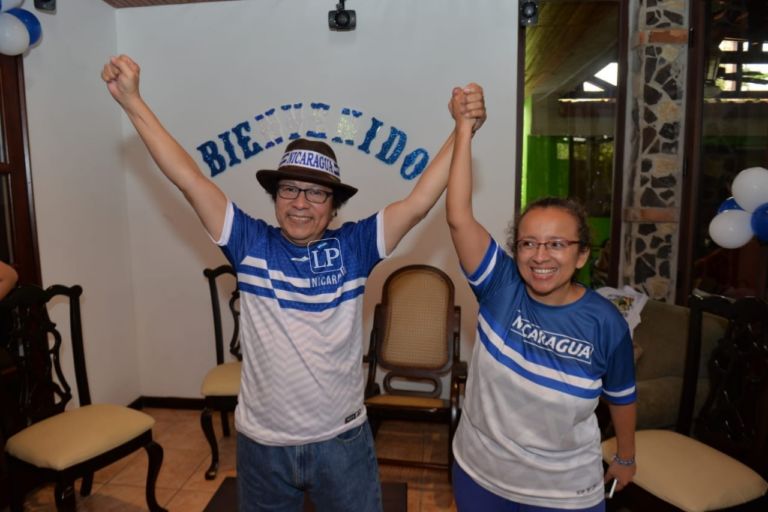Journalists Lucía Pineda and Miguel Mora, as well as 100 other political prisoners from Nicaragua, were released from prison
Washington, D.C. June 11, 2019. The Nicaraguan authorities released 106 political prisoners this week, 100 men and 6 women, who were unjustly imprisoned for months. Among those released were two […]

Washington, D.C. June 11, 2019. The Nicaraguan authorities released 106 political prisoners this week, 100 men and 6 women, who were unjustly imprisoned for months. Among those released were two journalists represented by Race and Equality, Lucía Pineda and Miguel Mora, Editor-in-Chief and Director of the 100% News Channel, respectively.
The release of the political prisoners was done under the recently approved Law No. 996, the Amnesty Law, whose approval merited international condemnation for the impunity that it promotes with respect to crimes against humanity committed by the authorities and parastatal forces. This law threatens political prisoners with the loss of the amnesty if they again commit acts that constitute the crimes for which the law grants amnesty. The Nicaraguan authorities have not managed to address the clamor for justice for the victims of repression even after a year of the start of the April protests.
Despite this, Race and Equality is pleased that the political prisoners can return to their homes and are no longer exposed to the cruel, inhuman and degrading treatment and the poor conditions that do not correspond to international standards that they were subjected to in prison.
The release of the journalists, as well as the release of the student leaders, peasant leaders, activists, and human rights defenders who had had greater public exposure during the crisis that began in April 2018 was carried out with the support of the International Red Cross. Besides Mora and Pineda, among the freed political prisoners are: Medardo Mairena, Pedro Mena, Amaya Coppens, Edwin Carcache, Nahiroby Olivas, Brandon Lovo, Glen Slate, Ricardo Baltodano, Carlos Brenes, Yubrank Suazo, Christian Fajardo, Irlanda Jerez and Olesia Muñoz.
“Here (in Nicaragua) there is a dictatorship, there is torture, human rights are violated, there is no freedom of press or expression, media offices are confiscated. Here journalists, citizens, and young people are arrested. That’s the truth, and it’s up to all the journalists to say it,” Miguel Mora told local media. Lucía Pineda said: “we will continue to inform everyone all around the world.”
As of today, 100% News Channel is still under capture by the National Police after being confiscated by the authorities in December 2018.
As a part of of the negotiations between the Nicaraguan Government and the Civic Alliance for Justice and Democracy (ACJD, for its initials in Spanish), which have been suspended since the political prisoner Eddy Montes Praslin died as a result of a shot fired by a prison guard, the authorities had promised to release all political prisoners by June 18, at the latest. In its resolution granting provisional measures to 17 political prisoners, the Inter-American Court of Human Rights had also requested that the government evaluate granting alternative measures instead of deprivation of liberty to these individuals, including journalists Miguel Mora and Lucía Pineda.
In the last two months, the Nicaraguan authorities released more than 600 opponents who were imprisoned for demanding justice for the victims of repression and democracy for the country. However, the Pro-Liberation Committee of Nicaraguan Political Prisoners counts 80 people on their lists who are still in prison.
Race and Equality continues to demand the immediate release of political prisoners, who for months have faced arbitrary judicial processes, torture, degrading treatment, and other human rights violations that demonstrate Nicaraguan State’s failure to comply with its international commitments on human rights.
We also demand full freedom for all political prisoners released, expungement of their criminal records, and that they be allowed to fully exercise their citizenship rights without intimidation, coercion, or reprisals of any kind.

